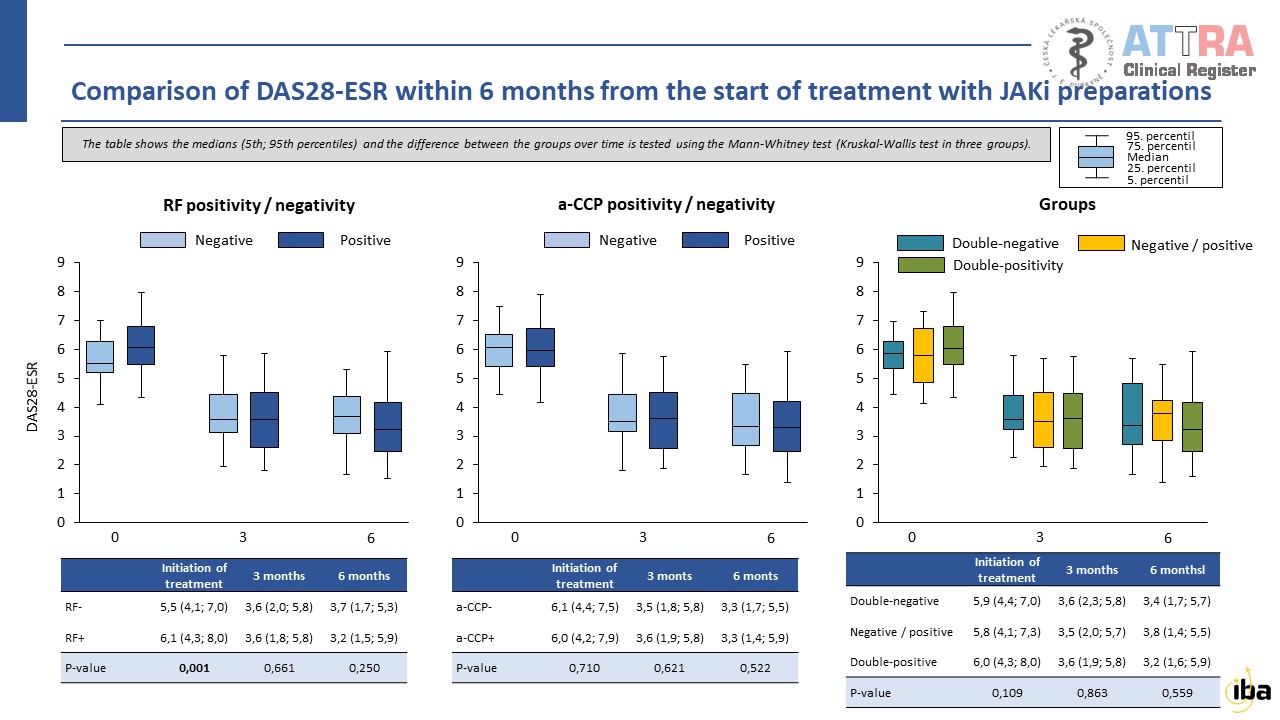Session Information
Date: Saturday, November 7, 2020
Title: RA – Treatments Poster II: Comparative Effectiveness, Biosimilars, Adherence & the Real World
Session Type: Poster Session B
Session Time: 9:00AM-11:00AM
Background/Purpose: Seropositivity / seronegativity in RA may have influence on response to bDMARDs or tsDMARDs. There is incomplete knowledge of differences in efficacy of JAK inhibitors in different subgroups of patients in real clinical practice. We aimed to compare treatment response between seropositive and seronegative RA patients in the Czech National Registry ATTRA.
Methods: We included patients with moderate to severe RA, who failed in the past MTX or bDMARDs. Primary outcome measure was change(∆) in DAS28 btw start of therapy and 6 months. Secondary outcomes measures were ∆SDAI and survival on therapy.
Results: We have included 263 patients treated with JAK inhibitors (130 tofacitinib, 133 baricitinib). Mean age at baseline was 55 ± 10 years, disease duration 13 ± 9 years, mean CRP in seropositive group was 25 mg/l and seronegative 21 mg/l (p = 0,012), mean DAS 28 ESR was 6.0 in seropositive and 5.6 in seronegative groups (p < 0.001). About 60 % patients have concomitant steroids. Concomitant treatment with MTX had 39 % in seronegative and 57 % in seropositive group (p = 0.028).
DAS 28 improved in both groups significantly. There were no differences between patients with double positivity (RF, anti CCP), single positivity or double negativity (Figure 1). There were no significant changes in SDAI as well. Adherence to therapy was very good, with no differences in seropositive and seronegative groups (68 % vs. 72 %).
Tolerance on therapy was good with no new signals and no differences between seropositive and seronegative groups.
Conclusion: There were no differences in efficacy of JAK inhibitors between seropositive and seronegative patients in Czech National Registry ATTRA. Double seropositive patients had more severe disease at baseline.
Funding: Supported by MHCR00023728
To cite this abstract in AMA style:
Pavelka K, Křístková Z. Treatment Outcomes in Patients with Seropositive versus Seronegative Rheumatoid Arthritis in Czech Registry ATTRA Treated with JAK Inhibitors [abstract]. Arthritis Rheumatol. 2020; 72 (suppl 10). https://acrabstracts.org/abstract/treatment-outcomes-in-patients-with-seropositive-versus-seronegative-rheumatoid-arthritis-in-czech-registry-attra-treated-with-jak-inhibitors/. Accessed .« Back to ACR Convergence 2020
ACR Meeting Abstracts - https://acrabstracts.org/abstract/treatment-outcomes-in-patients-with-seropositive-versus-seronegative-rheumatoid-arthritis-in-czech-registry-attra-treated-with-jak-inhibitors/

